 Technology peripherals
Technology peripherals
 AI
AI
 10 years in prison! Former Apple engineer Zhang Xiaolang pleads guilty to stealing secrets and switching to Xpeng
10 years in prison! Former Apple engineer Zhang Xiaolang pleads guilty to stealing secrets and switching to Xpeng
10 years in prison! Former Apple engineer Zhang Xiaolang pleads guilty to stealing secrets and switching to Xpeng
Former Apple engineer Zhang Xiaolang pleaded guilty.

Zhang Xiaolang admitted to the U.S. Federal Court in San Jose on Monday that he stole confidential business documents from Apple’s automotive division before joining Xpeng Motors.
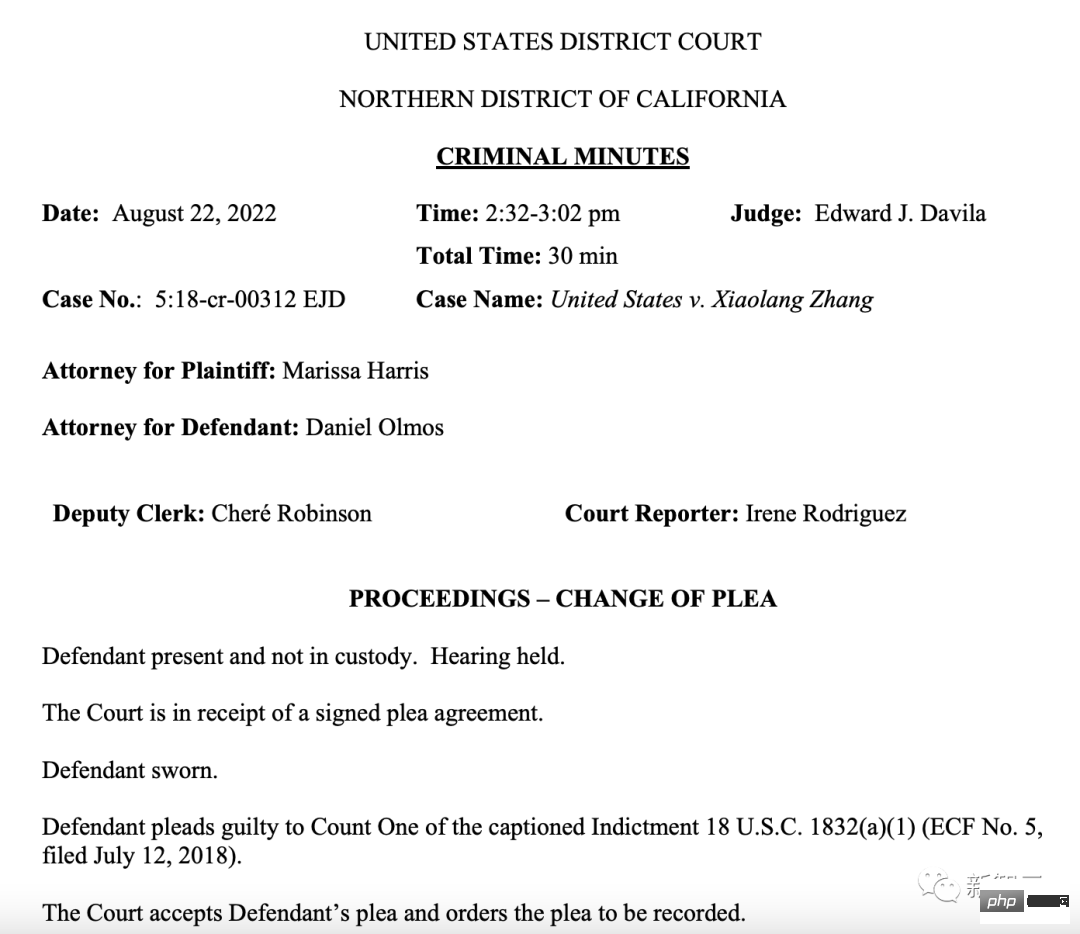
Court documents show that the current plea agreement reached between Zhang Xiaolang and the US court has not yet been made public.
After pleading guilty to charges of stealing trade secrets, he faces up to 10 years in prison and a $250,000 fine. Final sentencing will take place in November.
Review of the case
In fact, this case has been going on for 4 years from the time the parties were prosecuted to the present, and the FBI directly Caught at the airport.
As early as July 2018, Zhang Xiaolang, then an engineer in Apple’s autonomous driving department, was arrested by the FBI on suspicion of stealing secrets from Apple’s autonomous car project.
According to foreign media reports at the time, Zhang Xiaolang was pulled off by FBI agents at the last moment of his flight home. The plot of the story was like a spy movie.

At that time, the outside world generally concluded that Zhang Xiaolang’s arrest was closely related to Apple’s “Titan” project to build a car.
According to LinkedIn (now inaccessible), Zhang Xiaolang studied at the School of Information Science and Engineering of Southeast University in China from 2004 to 2008, and then in 2009 Studied at the University of British Columbia from 2011 to 2011.
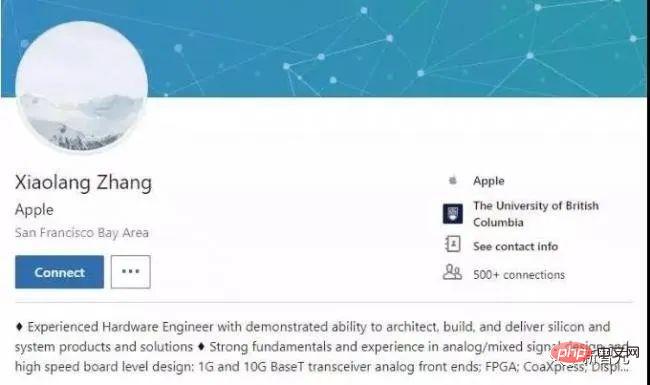
# Public information shows that Zhang Xiaolang was arrested in December 2015 Hired by Apple to participate in the development of Apple's self-driving car "Titan" project. He is responsible for designing and testing circuit boards on the team to analyze sensor data, and has received confidentiality training from Apple before joining.
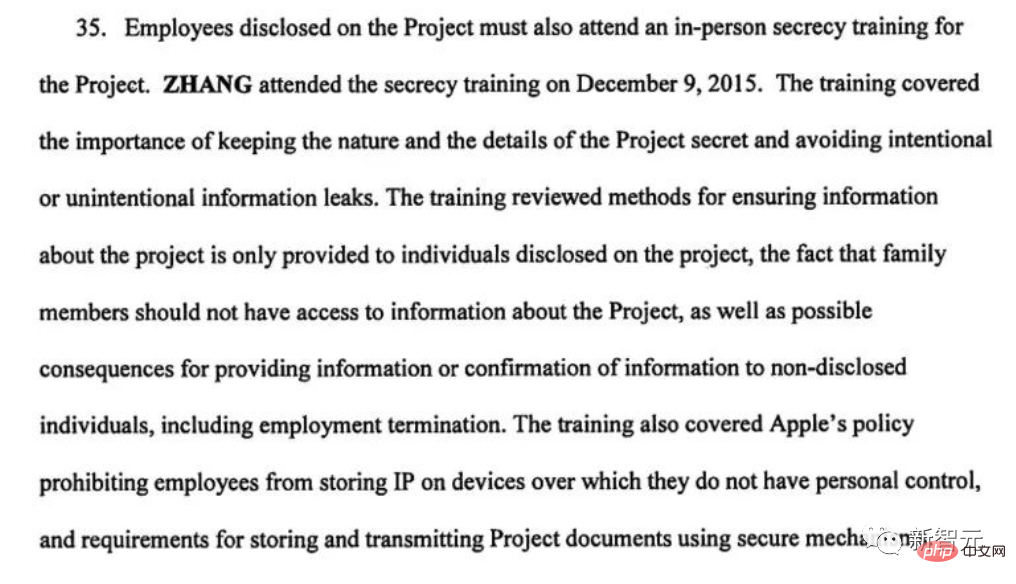
#In April 2018, I took family leave due to the birth of my child and traveled to China with my family.
The lawsuit stated that at the end of April that year, Apple had discovered that Zhang Xiaolang had conducted a large number of searches on secret databases, and a few days before his resignation, 581 user activity records, while there were only more than 600 in the previous month.
Zhang also allegedly downloaded data to a personal computer, including a 25-page secret design for a self-driving car circuit board.
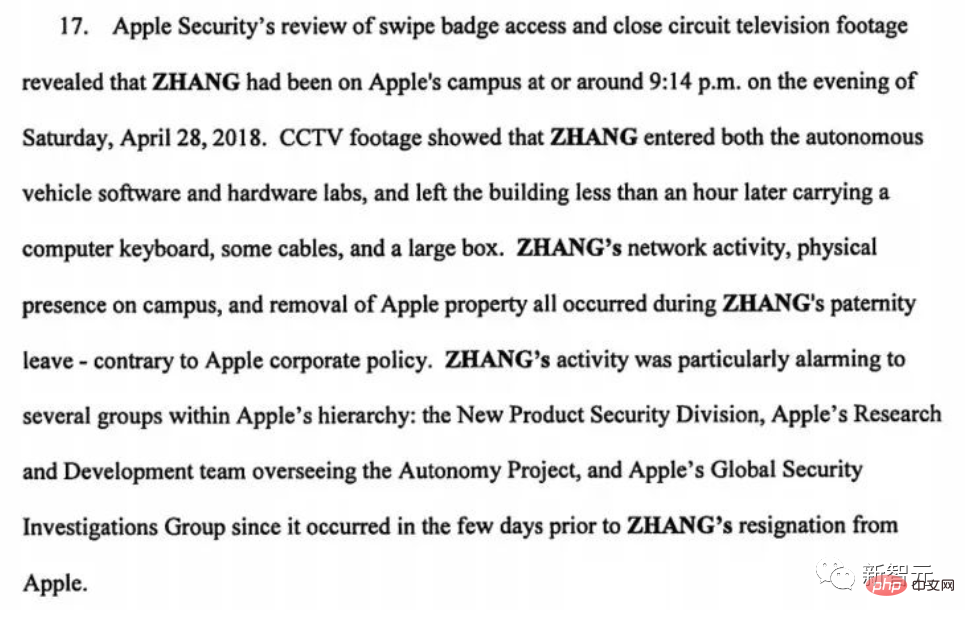
On the evening of April 28, Zhang appeared at the Apple campus and took away the A computer server and a circuit board, and his colleague also showed him a "proprietary chip." According to previous plans, he should still be taking paternity leave in China at this time.
#According to the park’s video surveillance, when Zhang Xiaolang left the laboratory that night, he was holding a computer keyboard, several connecting cables and a large box.
A few days later, Zhang Xiaolang submitted his resignation to Apple.
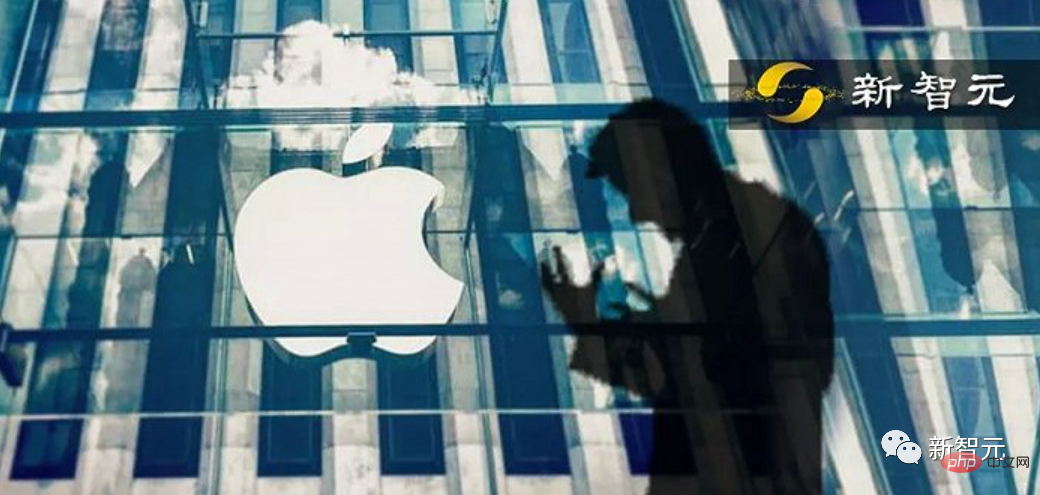
On May 1, Apple questioned Zhang based on the evidence it had. Faced with the video evidence, Zhang Apple admitted that he did take several circuit boards and a Linux server, and admitted that he was interested in seeking a position at Xpeng Motors. Additionally, Apple data was transferred to his wife's personal computer.
According to Apple’s investigation, the data totaled about 40G, of which “at least 60% were problematic.”
The FBI said Zhang disclosed his intention to work for a Chinese self-driving startup and, after downloading plans for self-driving car circuit boards, booked Flights to China.
#According to evidence provided by Apple, the FBI searched Zhang’s location in the United States on June 27.
#On July 7, Zhang was arrested by the FBI after passing through security at the San Jose Airport. He also became the first Chinese engineer to be arrested in the United States on suspicion of trade secret theft.
The arrest of Zhang Xiaolang by the FBI immediately attracted widespread attention at home and abroad. Both Chinese and foreign technology media reported this news at large lengths.
Xpeng Motors, which was involved in the incident, also issued a statement immediately, saying that the company would "actively cooperate with the investigation", but denied that it had previously known about the matter.
We are paying attention to the news that foreign media reported on July 11 that former Apple employee Zhang Xiaolang was arrested and prosecuted by the FBI for stealing trade secrets.
Xpeng Motors attaches great importance to the protection of intellectual property rights and always regards compliance as the basic guideline for all employees. Zhang Xiaolang signed an intellectual property compliance document on the day he joined the company in early May, and there is no record showing that he reported any sensitive or illegal situations to Xpeng Motors. We learned on June 27 that relevant local departments in the United States were investigating Zhang Xiaolang and sealed Zhang Xiaolang’s computers and office supplies in accordance with regulations. We will continue to actively cooperate with relevant investigations on this matter and follow the handling methods of relevant local departments.
Prior to this, Xiaopeng Motors was not aware of this matter and was not involved in it in any form. Xpeng Motors will maintain attention and cooperation on the matter and work hard to do relevant cooperation. Thank you all for your attention and understanding.
Secret Stealing Rashomon
Coincidentally, Zhang Xiaolang is not the only engineer accused by Apple.
On January 22, 2019, the FBI announced that former Apple engineer Chen Jizhong had stolen trade secret documents on Apple’s self-driving car program.
The document states that Chen Jizhong took about 100 photos in the Apple building and stored them on his personal devices, along with more than 2,000 manuals, schematics and diagrams. documents containing Apple’s confidential information and proprietary material.
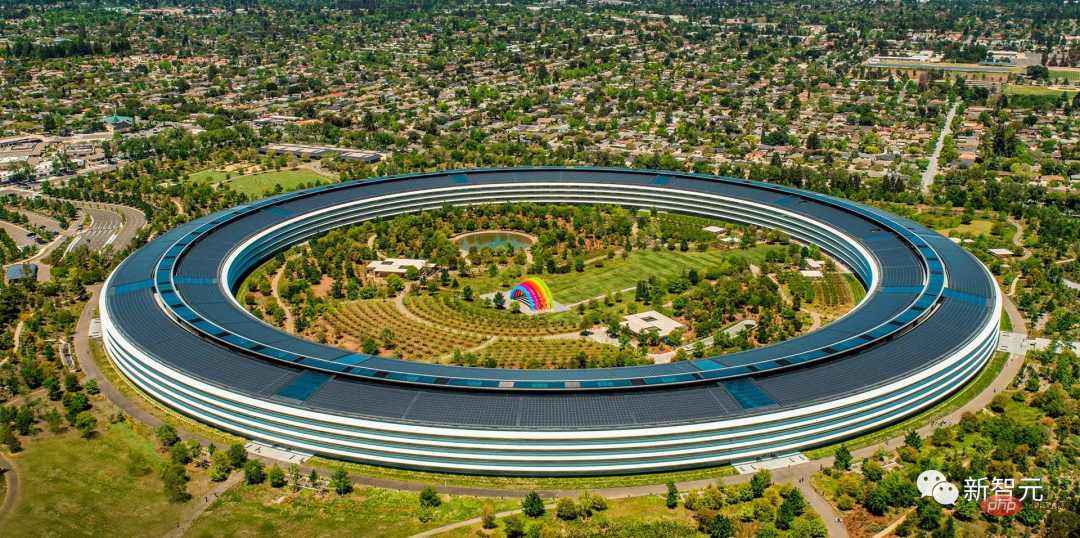
On January 25, Chen was released from federal custody after paying $500,000 in cash and property. Xpeng Motors responded at the time that it had never interviewed the employee.
# In March of the same year, Tesla accused Cao Guangzhi, its former Autopilot engineer, of stealing company trade secrets.
#After uploading more than 300,000 files and directories and copies of source code to his personal iCloud account, he suddenly left his job to join Xpeng Motors.
According to previously reported LinkedIn information, Cao Guangzhi graduated from the Department of Electronic Engineering of Zhejiang University with a bachelor's degree and a master's degree. He then received a doctorate from Purdue University and worked successively at GE Healthcare. , working at Apple.
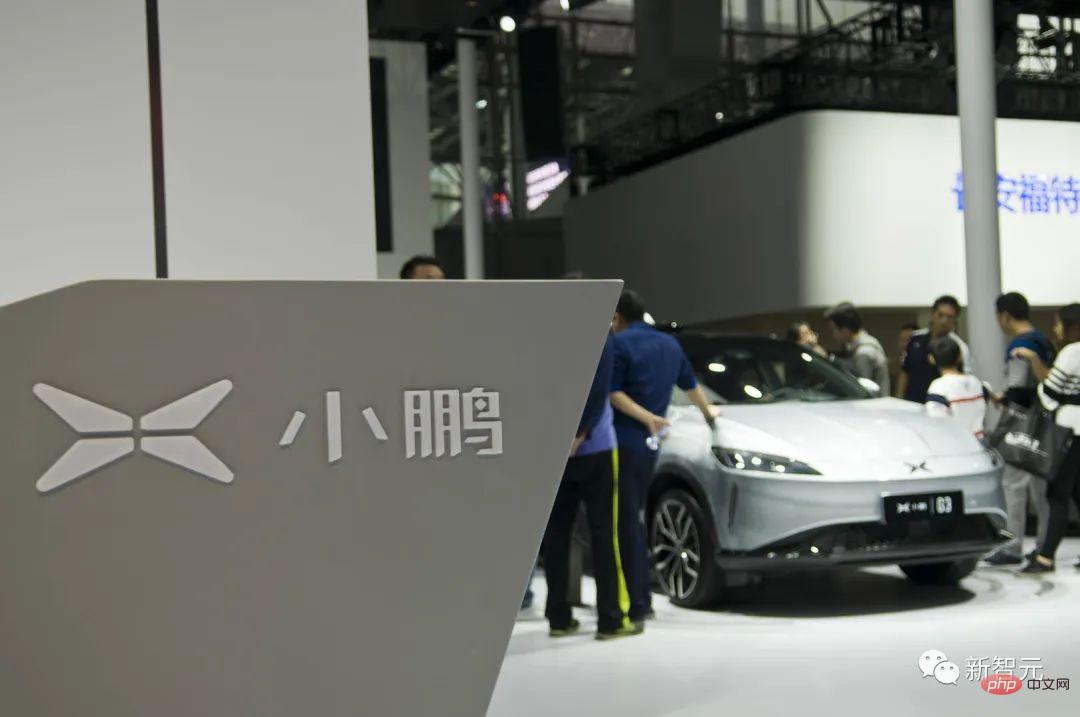
##Served as Tesla Autopilot computer vision scientist from April 2017 to January 2019, January 2019 Worked at Xpeng Motors.
During his tenure at Tesla, Cao Guangzhi had free access to the three major source code databases of Tesla firmware, autonomous driving and neural network, of which the neural network database was the most restrictive.
#However, out of thousands of employees in the company, only 40 people have access, and Cao Guangzhi is one of them.
At that time, Tesla stated in a statement that
If it cannot be lifted immediately, Tesla believes that Cao and his new employer will continue to have unrestricted access to Tesla’s high-end technology, the result of more than five years and hundreds of millions of dollars of investment. This is something they have no legal right to have.
After two years of litigation, the feud between Cao Guangzhi and Tesla has finally come to an end.
#In April 2021, Tesla has reached a settlement agreement with Cao Guangzhi and reached an agreement on claims.
# He admitted that he uploaded the Autopilot source code to his iCloud storage account while working at Tesla. But after leaving Tesla, he tried to delete the source code but failed.
#However, Cao Guangzhi has never disclosed or used the source code to third parties including Xpeng Motors for their benefit.
#In short, this settlement agreement finally proves Cao Guangzhi’s innocence and clears up Xiaopeng Motors’ grievances.
Regarding Zhang Xiaolang’s guilty plea, I wonder whether Xiaopeng can withstand this wave of public outcry. After all, the results it has used tens of millions of engineers to develop may be affected by this. This incident was labeled as plagiarism.

It’s really hard to describe.
The above is the detailed content of 10 years in prison! Former Apple engineer Zhang Xiaolang pleads guilty to stealing secrets and switching to Xpeng. For more information, please follow other related articles on the PHP Chinese website!

Hot AI Tools

Undresser.AI Undress
AI-powered app for creating realistic nude photos

AI Clothes Remover
Online AI tool for removing clothes from photos.

Undress AI Tool
Undress images for free

Clothoff.io
AI clothes remover

Video Face Swap
Swap faces in any video effortlessly with our completely free AI face swap tool!

Hot Article

Hot Tools

Notepad++7.3.1
Easy-to-use and free code editor

SublimeText3 Chinese version
Chinese version, very easy to use

Zend Studio 13.0.1
Powerful PHP integrated development environment

Dreamweaver CS6
Visual web development tools

SublimeText3 Mac version
God-level code editing software (SublimeText3)

Hot Topics
 1386
1386
 52
52
 deepseek ios version download and installation tutorial
Feb 19, 2025 pm 04:00 PM
deepseek ios version download and installation tutorial
Feb 19, 2025 pm 04:00 PM
DeepSeek Smart AI Tool Download and Installation Guide (Apple Users) DeepSeek is a powerful AI tool. This article will guide Apple users how to download and install it. 1. Download and install steps: Open the AppStore app store and enter "DeepSeek" in the search bar. Carefully check the application name and developer information to ensure the correct version is downloaded. Click the "Get" button on the application details page. The first download may require AppleID password verification. After the download is completed, you can open it directly. 2. Registration process: Find the login/registration portal in the DeepSeek application. It is recommended to register with a mobile phone number. Enter your mobile phone number and receive the verification code. Check the user agreement,
 Why can't the Bybit exchange link be directly downloaded and installed?
Feb 21, 2025 pm 10:57 PM
Why can't the Bybit exchange link be directly downloaded and installed?
Feb 21, 2025 pm 10:57 PM
Why can’t the Bybit exchange link be directly downloaded and installed? Bybit is a cryptocurrency exchange that provides trading services to users. The exchange's mobile apps cannot be downloaded directly through AppStore or GooglePlay for the following reasons: 1. App Store policy restricts Apple and Google from having strict requirements on the types of applications allowed in the app store. Cryptocurrency exchange applications often do not meet these requirements because they involve financial services and require specific regulations and security standards. 2. Laws and regulations Compliance In many countries, activities related to cryptocurrency transactions are regulated or restricted. To comply with these regulations, Bybit Application can only be used through official websites or other authorized channels
 Sesame Open Door Trading Platform Download Mobile Version Gateio Trading Platform Download Address
Feb 28, 2025 am 10:51 AM
Sesame Open Door Trading Platform Download Mobile Version Gateio Trading Platform Download Address
Feb 28, 2025 am 10:51 AM
It is crucial to choose a formal channel to download the app and ensure the safety of your account.
 Sesame Open Door Exchange App Official Download Sesame Open Door Exchange Official Download
Mar 04, 2025 pm 11:54 PM
Sesame Open Door Exchange App Official Download Sesame Open Door Exchange Official Download
Mar 04, 2025 pm 11:54 PM
The official download steps of the Sesame Open Exchange app cover the Android and iOS system download process, as well as common problems solutions, helping you download safely and quickly and enable convenient transactions of cryptocurrencies.
 gate.io sesame door download Chinese tutorial
Feb 28, 2025 am 10:54 AM
gate.io sesame door download Chinese tutorial
Feb 28, 2025 am 10:54 AM
This article will guide you in detail how to access the official website of Gate.io, switch Chinese language, register or log in to your account, as well as optional mobile app download and use procedures, helping you easily get started with the Gate.io exchange. For more tutorials on using Gate.io in Chinese, please continue reading.
 Is there any mobile app that can convert XML into PDF?
Apr 02, 2025 pm 08:54 PM
Is there any mobile app that can convert XML into PDF?
Apr 02, 2025 pm 08:54 PM
An application that converts XML directly to PDF cannot be found because they are two fundamentally different formats. XML is used to store data, while PDF is used to display documents. To complete the transformation, you can use programming languages and libraries such as Python and ReportLab to parse XML data and generate PDF documents.
 How to download gate exchange Apple mobile phone Gate.io Apple mobile phone download guide
Mar 04, 2025 pm 09:51 PM
How to download gate exchange Apple mobile phone Gate.io Apple mobile phone download guide
Mar 04, 2025 pm 09:51 PM
Gate.io Apple mobile phone download guide: 1. Visit the official Gate.io website; 2. Click "Use Apps"; 3. Select "App"; 4. Download the App Store; 5. Install and allow permissions; 6. Register or log in; 7. Complete KYC verification; 8. Deposit; 9. Transaction of cryptocurrency; 10. Withdrawal.
 How to find the download link of Ouyi okx Android and Apple
Feb 21, 2025 pm 05:39 PM
How to find the download link of Ouyi okx Android and Apple
Feb 21, 2025 pm 05:39 PM
Ouyi OKX is a world-leading cryptocurrency exchange that provides users with a safe and convenient trading experience. Users can download Ouyi OKX's mobile apps, including Android and Apple versions through official channels.



